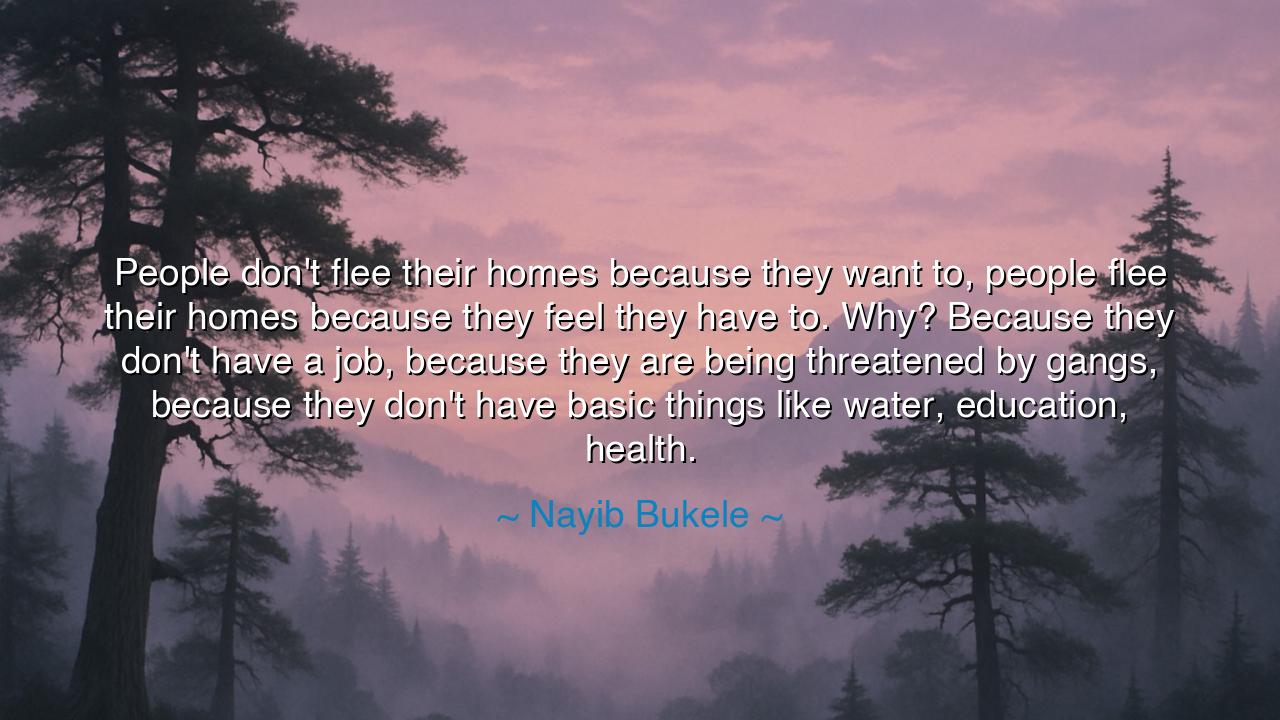
People don't flee their homes because they want to, people flee
People don't flee their homes because they want to, people flee their homes because they feel they have to. Why? Because they don't have a job, because they are being threatened by gangs, because they don't have basic things like water, education, health.






The modern leader Nayib Bukele, speaking from the heart of a land long tested by hardship, once said: “People don't flee their homes because they want to, people flee their homes because they feel they have to. Why? Because they don't have a job, because they are being threatened by gangs, because they don't have basic things like water, education, health.” In these words, he does not speak as a politician, but as a witness to the suffering of humanity. His voice carries the sorrow of countless families torn from their homes, the grief of fields left untended, and the silence of streets once filled with laughter. His quote is not merely a statement—it is an indictment of injustice, a plea for compassion, and a call to understand the true meaning of home.
For in every age, those who flee are not the faithless or the cowardly—they are the desperate. The refugee, the migrant, the wanderer—these figures have walked beside humanity since the dawn of civilization. The ancients knew them well. When famine struck Egypt, the sons of Jacob left their homeland and journeyed to find bread. When the walls of Troy fell to fire, Aeneas fled across the sea, carrying his father on his back and the future of Rome in his heart. And in every age since, men and women have abandoned their homes not because they desired exile, but because they were driven by forces greater than their will—war, poverty, persecution, or despair. Bukele’s words echo this eternal truth: no one abandons their roots unless the soil itself has turned against them.
When he says, “people flee because they feel they have to,” Bukele reminds us that migration is not born of whim, but of necessity. A person who has no job, who cannot feed his children, who wakes each morning to the sound of violence, or the taste of thirst, is not choosing freedom—he is choosing survival. To lose one’s home is to lose the foundation of one’s identity. Home is not merely a house; it is belonging, safety, memory, and hope. When these are stripped away, a person becomes like a tree torn from the earth—still alive, but wandering in search of soil that will take root again.
In his homeland of El Salvador, Bukele has seen this truth carved into the faces of his people. For decades, Central America has suffered from poverty, gang violence, and corruption, forcing millions to seek refuge beyond its borders. Yet he reminds the world that those who depart are not seeking riches—they are seeking life itself. They are mothers who walk across deserts with children in their arms; fathers who sell all they own for a chance at safety; youths who flee not for adventure, but to escape the shadow of death. Their journey is not one of ambition, but of anguish.
This truth, however, is not confined to one nation or time. History tells the same story again and again. In the years after World War II, millions of displaced people wandered across Europe—farmers, teachers, children—each carrying fragments of a world that no longer existed. In more recent times, families from Syria, Sudan, and Venezuela have walked the same path of exile, their faces illuminated not by hope of prosperity, but by the bare desire to survive. Their suffering is a mirror in which we all may see ourselves—for in every heart lies the instinct to seek safety and dignity.
The origin of Bukele’s quote lies in his confrontation with this crisis of migration. As a leader, he observed that to end suffering, one must treat its roots, not merely its symptoms. He saw that fences and borders cannot stop the flow of despair; only justice, opportunity, and compassion can. His words carry the wisdom that true leadership is not measured by how one defends a boundary, but by how one restores a broken home. For when a nation gives its people work, safety, and dignity, no one will wish to flee.
And so, from these words arises a lesson for all generations: that the health of a society is measured not by its wealth, but by the security of its most vulnerable. If we would prevent the tragedies of exile, we must build worlds worth staying in. Let us give our people education, so their minds may build futures. Let us give them clean water, so their children may grow. Let us create jobs, not only for survival, but for dignity. And above all, let us protect one another from fear—whether it comes from violence, injustice, or neglect.
Thus, Nayib Bukele’s words stand as both lament and commandment. They remind us that no one leaves home lightly, that behind every migrant’s footsteps lie stories of courage and loss. Let the privileged learn empathy, and the powerful learn responsibility. Let every person strive to make their home a place of peace, where none must flee and all may flourish. For when we build a world where no one feels they have to leave, we will have fulfilled the most ancient and sacred duty of humanity—to make the earth a home for us all.






AAdministratorAdministrator
Welcome, honored guests. Please leave a comment, we will respond soon